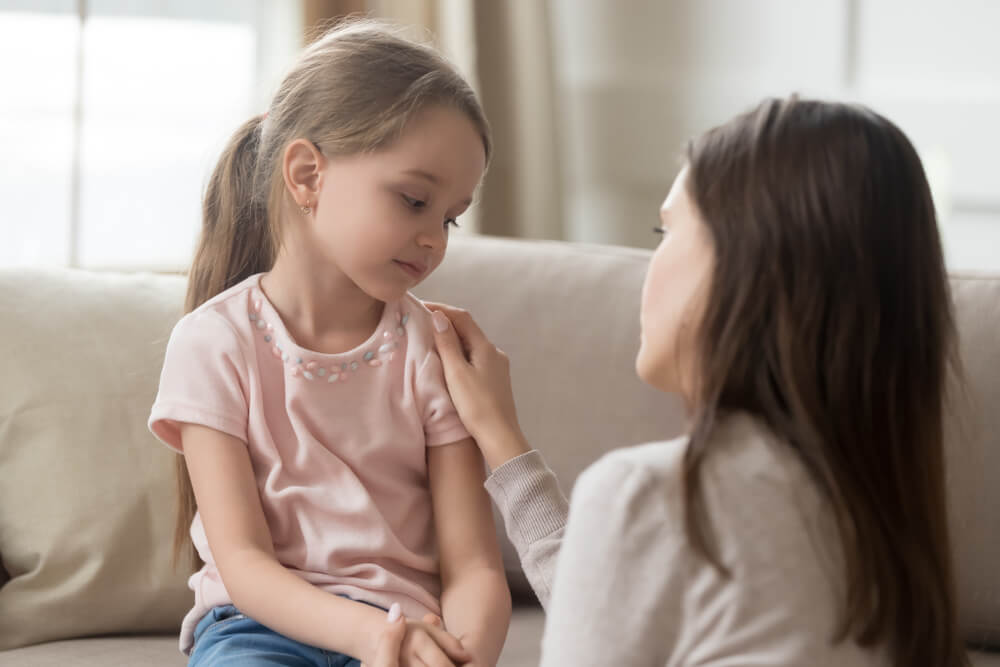No matter what age your children are, talking to them about depression can make you as a parent feel scared, overwhelmed, and even a bit uncomfortable.
After all, you’re probably not a licensed counselor or therapist. And, you may not have had many conversations about depression or mental health with your parents when you were growing up.
However, millions of people struggle with depression every year, and it’s perfectly normal to discuss it with your children. In fact, discussing the topic of depression openly with your kids not only helps them learn how to process and understand their own emotions, but it can help them better understand the world and the people around them.
If you’re intimidated at the thought of bringing up depression with your own kids, here are a few practical tips on how to talk about depression with children.
First Things First: Understand the Causes and Symptoms of Depression for Yourself
Before you can even begin to discuss the topic of depression with your children, you must first take some time to understand what exactly depression is. If you’re unsure, now would be a good time to either refresh your memory or learn more about it.
To learn more about the signs, symptoms, and treatments for depression in children, our recent article “Signs of Depression in Children & How to Help” is a great resource to read through and keep on hand. Also, it would be good for a parent to know How Depression Affects the Teenager’s Brain and Body.
Talking to Your Kids About Depression: 6 Practical Tips
Now that you understand what depression is, you can begin to approach the topic with your kids. Here are seven practical tips to help you do just that.
- Introduce mental health vocabulary early on.
Talking about mental health with your children is so much easier if they have the right vocabulary. From an early age, consider introducing your children to common mental health words and phrases.
While they may not be able to understand the concept of ‘depression’ right away, you can still introduce them to simpler words for emotions like worry, sadness, and fear. If you need help with this, there are many children’s books out there that can help you introduce these words to your child.
- Encourage your child to speak freely about their emotions.
In addition to exposing your child to common mental health vocabulary, you should also encourage them to actually use these vocabulary words for themselves! Throughout each day, make sure to ask your child how they are feeling. If your child tends to turn to physical means of expressing themselves, try to encourage them to use words rather than actions to explain their emotions to you.
When children grow up in households that are open about emotions from the beginning, they are better prepared to discuss more complex mental health topics – like depression – as they age into adulthood.

- Stick to the facts.
When thinking about how to explain depression to your kids, it’s important to always stay grounded in reality and stick to the facts. You don’t have to make up fake stories or scenarios to make the topic of depression more palatable for your child, and you certainly do not need to pretend that it doesn’t exist.
That being said, there are still ways to keep the conversation realistic while also explaining the concept of depression on a level that your child understands.
For example, if you or your partner are struggling with depression, try to stick with phrases like “mommy/daddy is feeling sad today”. You don’t need to lie and say that everything is fine, but you can still let your child know that you or your partner are struggling with feelings of sadness.
By being open and honest with your child, you will gain both their trust and their respect.
- Share age-appropriate mental health resources with them.
Another great way to help your children talk about depression is to share some age-appropriate resources with them. Typically, you can find dedicated children’s mental health resources by searching online or by contacting your child’s school counselor. This could be anything from a helpful picture book to an animated cartoon geared for children about depression.
Resources like this can at the very least give you a place to start with your child. When you watch a video or read a book about depression together with your child, you will both be on the same side and able to tackle the complex topic together. Not only that, but your child will have a reference point for discussing their thoughts about depression with you.
- Give them some space.
Mental health is an abstract and sometimes heavy topic for children to grasp. That’s why it’s so important to give them some space to think and reflect after speaking with them about depression.
It is unrealistic to expect them to understand or be okay with everything instantly. However, when given some quiet time and space, they are likely to come around and ask questions or share their thoughts, feelings, and ideas with you.
The best way to give your kids some space is to encourage them to do something fun and creative. Children process their thoughts through play, so try to follow up your conversation by letting them paint, draw, build, and play with their toys.
- Ease worries by providing reassurance.
When explaining depression to a child, be aware that it may cause them feelings of worry or fear. This is totally normal, and there are things that you can do to help ease these fears.
If you are speaking about your own battle with depression, your child may be concerned that you will leave the household or even die from it. You can combat these worries by comforting them, letting them know that you are seeking appropriate help, and explaining to them that you love them and that everything will be okay.
If you are bringing up the topic of depression because you think that your child may be suffering from it, there are a few other ways to reassure them. This includes explaining that depression is normal, reminding them that you will love them no matter what, and letting them know that you will find them some help and support.

- Keep an open line of communication.
Mental health – especially depression – is not something that you can just compartmentalize into one conversation and be done with. It actually takes years of open conversation for children to be able to fully understand what it means. When discussing depression with your child, make sure that they know that they can always come to you if they have any questions.
As a parent, that also means you need to allow yourself to be open and available to these conversations as well. You never know when your child may feel inspired to chat about depression with you, so be ready to have these conversations when they do pop up.
Consider every time that your child mentions depression, worry, sadness, or fear to be an opportunity for them to learn more about it.
Final Thought: You Don’t Have to Have All of the Answers
Knowing how to explain depression to a child might not come naturally to you as a parent – but that’s okay! You don’t have to become a certified mental health expert overnight, and it’s okay to ask for backup when you need it.
The best way to do this is to make a list of trusted family members, friends, and resources that you can turn to when you are struggling.
If you are still feeling overwhelmed even after seeking support from your immediate bubble, consider reaching out and talking to a doctor about depression – they are there to help you!




